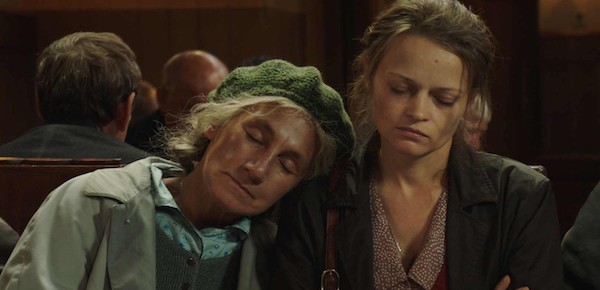A Gentle Creature
A complex allegory for life in modern Russia that confounds narrative sense at every turn.
Plot summary
A woman living in rural Russia (Vasilina Makovtseva) receives a package. It’s addressed to her incarcerated husband, but marked ‘Return to Sender’. With no explanation at hand, and besieged by concern over her spouse’s wellbeing, the woman has no choice but to travel to the prison and seek an answer for herself. But as she journeys deeper into the insidious ecosystem that has built up around it, the more she finds herself lost in the harsh, labyrinthine society within.
It’s difficult to write about A Gentle Creature. This is partly by design, of course, with writer/director Sergei Loznitsa refashioning a Dostoyevsky short story into a sprawling, elusive, beguiling epic. What quickly becomes apparent during Loznitsa’s two-and-a-half-hour opus is that it’s a film of ravishing ambition, mounting a complex allegory for life in modern Russia that confounds narrative sense at every turn. In its place is an intricate framework of signs and signifiers, vignettes of dreamlike absurdity that flow with hazy indifference towards somewhere, well, let’s just say ‘bleak’.
To summarise and describe each turn of events would be futile, because it isn’t the individual moments the characters and scrapes our sacrificial lamb of a heroine encounters that matter, so much as their cumulative momentum. Loznitsa’s structure is undeniably intricate, but it’s suffused with a heavy sense of inevitability. So thick and unwieldy are the situations – from low-key altercations with admin clerks to more aggressive confrontations with blinkered police officers – and so vivid is the world that Oleg Mutu captures onscreen that it feels overwhelmingly like Kafka in motion. As much of a compliment as this was intended to be, it doesn’t make for a simple review.

Changing gears from blackly-comic absurdity to straight-up surrealism, before striking a note of unflinching brutality.
But as well as this – more so, even – A Gentle Creature is difficult to write about because it’s so damn hopeless. As the eponymous waif, Vasilina Makovtseva is heartbreakingly vulnerable, entering this impenetrable world with wide-eyed optimism unwarranted by the direness around her. We long so much for some sort of reprieve, a glimmer of hope for this bastion of innocence adrift in a world destined to crush it, even as we know it will never come. The coldness with which Loznitsa holds his magnifying glass to this suffering woman renders the dramaturgy a drawn-out death march. This particularly informs a dramatic tonal shift in the third act, changing gears from blackly-comic absurdity to straight-up surrealism before striking a note of unflinching brutality that makes the film’s metaphor uncomfortably literal.
For many, it will be far too much to take. The elliptical, parable-like snippets of dialogue offer little to hold onto on a scene-by-scene basis. It’s unwieldy 160-minute runtime is daunting, to say the least, and conducive to a slow-burn atmosphere akin to a nightmare. And it ultimately goes to some ugly, ugly places in service of its polemic allegory, sending you out into the world with a sense of implacable disquiet and something like nausea. But in its own messy, stubbornly-obtuse way, it expresses something absolutely vital.











COMMENTS